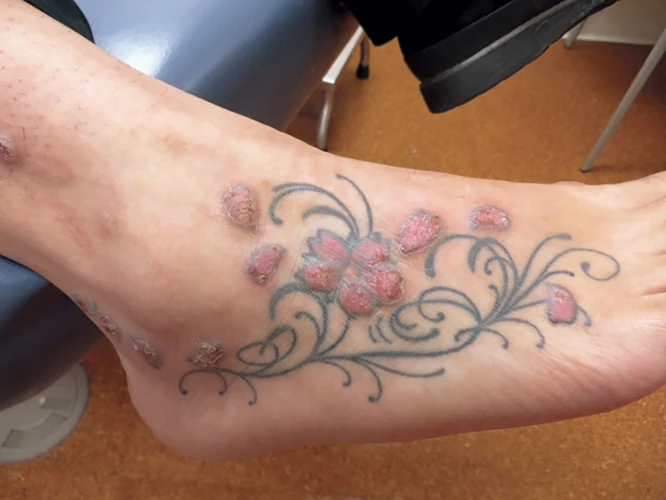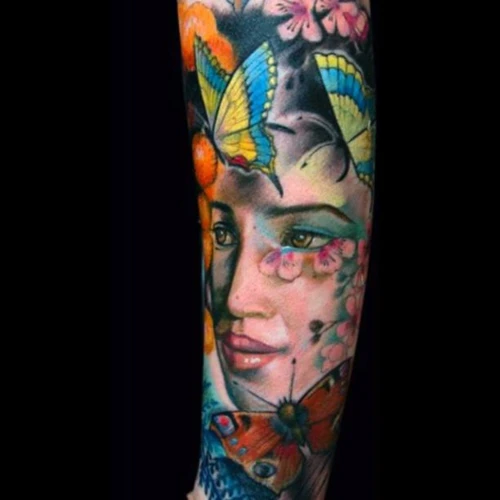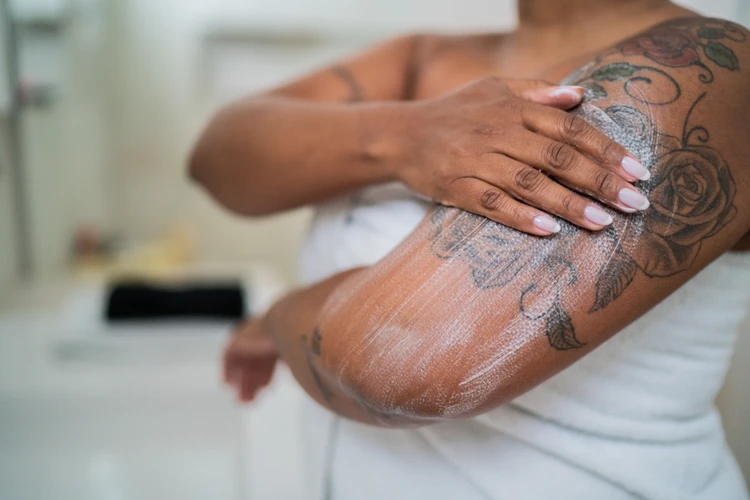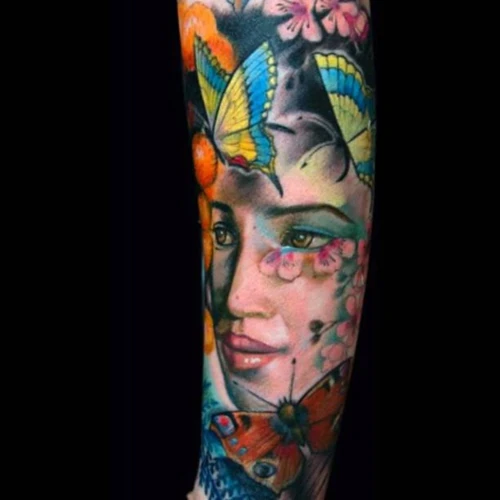If you’ve recently gotten a tattoo, you may be wondering “how long do tattoos itch?” As your skin heals, it can become itchy and uncomfortable, but don’t worry! It’s a common part of the healing process and it won’t last forever. In this article, we’ll discuss how long tattoos typically itch and offer tips for relieving the itch. Keep reading to find out more!
Contents
How Long Does Tattoo Itch Last?

- Most tattoos will start itching after about three to five days. During this period, the skin begins to heal and the body’s natural healing process kicks in.
- The itching typically lasts for a few days or weeks. The amount of time it takes for the itch to subside depends on how well the tattoo was applied and your body’s natural healing process.
- Itching can be relieved with over-the-counter products. Antihistamines and hydrocortisone creams can help to reduce the itching sensation.
- You should not scratch your tattoo. Scratching can cause damage to the healing skin and can increase the risk of infection.
- You should wait for the itching to subside before touching your tattoo. Touching your tattoo too soon can increase the risk of infection and cause further damage.
- When can I itch my tattoo? You should wait until the itching has completely subsided before touching your tattoo. This can take anywhere from a few days to a few weeks, depending on the healing process.
Why Can’t You Scratch a Tattoo?

Getting a tattoo is an exciting experience, but it can also be a painful one. After the tattoo is finished, the skin often itches as it heals. Although it can be incredibly tempting to scratch the tattoo, it is very important that you don’t. Scratching a tattoo can cause serious damage and may even lead to infection.
It Can Damage the Tattoo
The skin heals from the tattoo process by forming a thin layer of scabbing. Scratching the scab can pull the pigments out of the skin and cause the tattoo colors to blur and fade. This can leave you with a tattoo that doesn’t look as good as it should. Not only that, but it can also cause the tattoo to heal in an uneven way, leaving behind bumps and ridges.
It Can Cause Infection
Scratching the skin when it is healing can also put you at risk of infection. The scab that forms over the tattoo can trap dirt, bacteria, and other contaminants, increasing the risk of infection. Not only that, but scratching can open up the skin and make it vulnerable to infection from the outside. In some cases, this can lead to serious complications such as sepsis.
When Do Tattoos Stop Itching?

Itching is a common side effect of getting a new tattoo. It can be bothersome and even painful at times, but it is a normal part of the healing process. Generally speaking, tattoo itching will last anywhere from a few days to a few weeks.
Here is an approximate timeline of when you can expect your tattoo to stop itching:
- Day 1-2: Itching begins to subside.
- Week 1-2: The majority of the itching should be gone.
- Week 3: The area should be healed and the itching should be completely gone.
It is important to note that everyone’s healing process is different and the timeline above is only an estimate. Some people may experience more or less itching than others.
How to Stop the Itching
If your tattoo is still itching after the first few days, there are a few things you can do to help.
- Keep the area clean and dry. Gently wash the tattoo with mild soap and water and pat dry with a clean towel.
- Apply a moisturizer. Use an unscented, dye-free moisturizer to help keep the area hydrated.
- Avoid excessive scratching. If your tattoo starts to itch, try to resist the urge to scratch. This can cause further irritation and even damage the skin.
If your itching is severe or persists beyond a few weeks, it is best to contact your tattoo artist or a doctor. They can help diagnose the problem and provide advice on how to best care for your tattoo.
Bottom Line
Tattoo itching is a normal part of the healing process and should subside within a few weeks. If your itching persists or becomes severe, it is important to seek medical advice. With proper care and patience, your tattoo will heal and the itching will go away.
When Will My New Tattoo Stop Itching?

The short answer: Itching is a normal part of the healing process and typically subsides within two weeks.
The long answer: Tattoo itching is common in the days and weeks following your appointment. It typically peaks within the first few days and begins to subside after the first week. Itching may last up to two weeks and can be especially uncomfortable in the first few days.
Why is it bad to scratch a tattoo? Scratching your tattoo can damage the skin and lead to infection. It can also cause fading and blurriness of the tattoo. To avoid these problems, keep the area clean, moisturized, and bandaged to prevent scratching.
How to relieve the itching:
- Keep the area clean and moisturized.
- Apply a cold compress.
- Try using a mild, unscented lotion.
- Avoid scratching with fingernails.
- Keep the area well-ventilated.
- Take lukewarm baths.
How to Keep from Scratching Tattoo at Night

Keep the Tattoo Clean
Keeping your new tattoo clean is essential to prevent it from itching. Clean your tattoo with an anti-bacterial soap and warm water. Then rinse the area with cold water and pat it dry with a clean cloth. Do not rub the area.
Moisturize the Tattoo
After you have cleaned your tattoo, apply a moisturizing lotion or ointment to the area. This will help soothe the skin and prevent it from drying out. If you are using a lotion, make sure it is a mild, unscented moisturizer, as scented lotions can irritate the skin.
Wear Loose Clothing
It is important to wear loose clothing over your tattoo, especially at night. Tight clothing can cause irritation and make the itching worse. Choose clothing made from natural fibers such as cotton or linen, as they are more breathable than synthetic fabrics.
Use Cold Compress
A cold compress can help soothe the itching sensation. You can make a cold compress by wrapping a few ice cubes in a clean cloth or using a cold pack. Place the compress over the tattoo for 15-20 minutes to reduce the itching.
By following these simple steps, you can help prevent your tattoo from itching at night and ensure it heals properly. Remember, if the itching persists or gets worse, contact your doctor or tattoo artist for advice. With the proper care and attention, your tattoo will soon stop itching and you can enjoy your new artwork.
Tips to Help Minimize Itching
Do Not Touch the Tattoo
The first rule of keeping your tattoo from itching is to keep your hands off it. Touching the tattoo will cause bacteria to enter the wound, increasing the risk of infection. Additionally, constantly touching the tattoo can cause the healing process to take longer, and may even cause the ink to fade. To prevent yourself from touching the tattoo, try wearing loose and comfortable clothes that won’t rub against it.
Avoid Sun Exposure
The sun’s ultraviolet rays can cause your tattoo to fade and cause it to become irritated. To minimize this, avoid exposing the tattoo to the sun for at least two weeks after it has been completed. If you must go outside, make sure to cover the tattoo and use a broad spectrum sunscreen with an SPF of at least 30.
Take an Oatmeal Bath
Taking an oatmeal bath can help soothe the itching sensation caused by a new tattoo. Simply fill a bathtub with warm water and add a cup of oatmeal. Sit in the bath for at least 15 minutes. This will help to reduce inflammation and keep the tattoo from becoming too dry. Additionally, this can help to keep you from scratching the tattoo at night.
Frequently Asked Questions
How Can I Avoid Itching My Tattoo?
The best way to avoid itching is to keep the area surrounding your tattoo clean and dry. Wash the tattoo gently with a mild soap and lukewarm water, then pat it dry with a clean towel. Apply a thin layer of a fragrance-free moisturizer or ointment to help reduce itching and irritation. Avoid scratching the area, as this can lead to infection. If the itching persists, contact your tattoo artist or doctor for advice.
Is there anything I can do to speed up the healing process?
Yes! Here are a few tips to help you speed up the healing process and reduce the itching sensation:
- Wash the tattoo with lukewarm water and a mild soap to keep it clean.
- Apply a moisturizing lotion or ointment, such as A+D ointment or Aquaphor, to keep the skin hydrated.
- Avoid scratching or picking at the tattoo. This can cause infection and delay healing.
- Wear loose clothing to avoid irritating the area.
- Avoid direct sunlight and tanning beds until the tattoo is fully healed.
- Avoid swimming and soaking the tattoo until it is fully healed.
By following these tips, you can help reduce the itching sensation and speed up the healing process.
Is it safe to apply lotion to my newly-tattooed skin?
- Yes – Lotions are generally safe to apply on newly-tattooed skin, provided they are non-scented and moisturizing.
- No – Avoid using lotions that contain harsh chemicals, alcohol, and fragrance as these can irritate your tattoo and lead to infection.
- When to Apply – It is best to wait until your tattoo has healed completely, which can take up to two weeks, before applying lotion.
It is important to keep your tattooed skin moisturized to prevent it from drying out and scabbing. Applying lotion helps to lock in moisture and protect your skin from irritants. However, it is important to choose the right lotion for your newly-tattooed skin. Look for lotions that are free of alcohol and fragrance, as these can irritate your skin and lead to infection. It is also important to avoid lotions that contain harsh chemicals. Once your tattoo has healed completely, usually after two weeks, you can begin to apply lotion to your skin.
How can I tell if my tattoo is healing correctly?
- Colour Appearance: Tattoos should appear bright and vibrant once the healing process is complete. If the colour looks dull or faded, it is likely that your tattoo hasn’t healed correctly.
- Texture: During the healing process, the tattoo should feel smooth and even. If your tattoo feels bumpy or raised, it is likely that it has not healed correctly.
- Signs of Infection: Signs of infection include redness, swelling, pain and/or discharge from the tattooed area. If any of these signs are present, it is likely that your tattoo has not healed correctly.
- Itching: Itching is a normal part of the healing process. However, if the itching is severe or if it does not subside after a few days, it could be a sign that your tattoo has not healed properly.
Should I be worried if my tattoo starts to itch after a few days?
- Itching is common: Itching is one of the most common side effects of getting a tattoo, and it typically starts a few days after the tattoo is applied. Don’t be alarmed if your tattoo starts to itch after a few days, as this is normal.
- Try not to scratch: It’s important to try not to scratch your tattoo, as this can cause damage to the skin and disrupt the healing process. Running a cool, damp cloth over the area can provide relief.
- See a doctor: If the itching persists and doesn’t get better with time, it’s important to see a doctor as it could be a sign of an infection. If you notice any signs of infection, such as pus, redness, or swelling, you should also seek medical attention as soon as possible.
In conclusion: Tattoos typically start to itch after a few days, but if the itching persists and doesn’t get better with time, it’s important to seek medical attention.
Conclusion
Tattoo itching is a common side effect of the healing process and typically lasts up to two weeks. After two weeks, if the itching persists, contact your tattoo artist or a doctor. Taking care of your tattoo properly during the healing process is the best way to minimize itching and ensure a successful outcome.